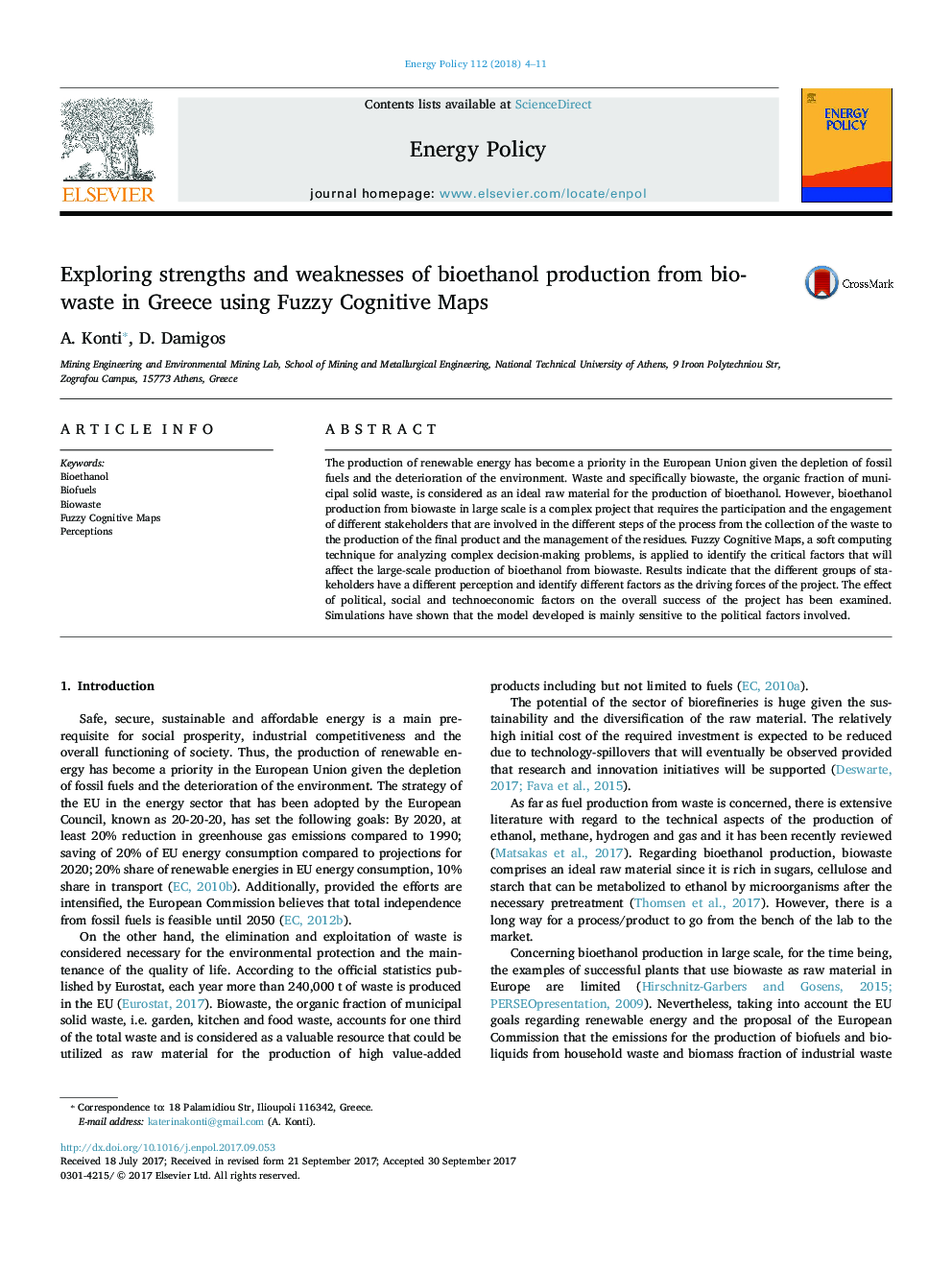| کد مقاله | کد نشریه | سال انتشار | مقاله انگلیسی | نسخه تمام متن |
|---|---|---|---|---|
| 5105459 | 1481246 | 2018 | 8 صفحه PDF | دانلود رایگان |
عنوان انگلیسی مقاله ISI
Exploring strengths and weaknesses of bioethanol production from bio-waste in Greece using Fuzzy Cognitive Maps
ترجمه فارسی عنوان
بررسی نقاط قوت و ضعف تولید بیواتانول از زباله های زیستی در یونان با استفاده از نقشه های شناختی فازی
دانلود مقاله + سفارش ترجمه
دانلود مقاله ISI انگلیسی
رایگان برای ایرانیان
کلمات کلیدی
ترجمه چکیده
تولید انرژی تجدید پذیر در اتحادیه اروپا با توجه به کمبود سوخت های فسیلی و بدتر شدن محیط، به عنوان یک اولویت تبدیل شده است. زباله و به طور خاص زباله، بخش آلی از زباله های جامد شهری، به عنوان مواد اولیه ایده آل برای تولید بیوتکنول در نظر گرفته می شود. با این حال، تولید بیواتانول از زباله در مقیاس وسیع، یک پروژه پیچیده است که نیاز به مشارکت و مشارکت ذینفعان مختلف دارد که در مراحل مختلف فرایند از جمع آوری ضایعات به تولید محصول نهایی و مدیریت باقی مانده نقشه شناختی فازی، یک تکنیک محاسباتی نرم برای تحلیل مسائل پیچیده تصمیم گیری، برای شناسایی عوامل بحرانی است که بر تولید بزرگ بیواتانول از زباله ها تأثیر می گذارد. نتایج نشان می دهد که گروه های مختلف سهامداران ادراک متفاوتی دارند و عوامل مختلفی را به عنوان نیروهای محرک پروژه شناسایی می کنند. تأثیر عوامل سیاسی، اجتماعی و تکنولوژیکی بر موفقیت کلی پروژه مورد بررسی قرار گرفته است. شبیه سازی نشان داده است که مدل توسعه یافته عمدتا به عوامل سیاسی درگیر است.
موضوعات مرتبط
مهندسی و علوم پایه
مهندسی انرژی
مهندسی انرژی و فناوری های برق
چکیده انگلیسی
The production of renewable energy has become a priority in the European Union given the depletion of fossil fuels and the deterioration of the environment. Waste and specifically biowaste, the organic fraction of municipal solid waste, is considered as an ideal raw material for the production of bioethanol. However, bioethanol production from biowaste in large scale is a complex project that requires the participation and the engagement of different stakeholders that are involved in the different steps of the process from the collection of the waste to the production of the final product and the management of the residues. Fuzzy Cognitive Maps, a soft computing technique for analyzing complex decision-making problems, is applied to identify the critical factors that will affect the large-scale production of bioethanol from biowaste. Results indicate that the different groups of stakeholders have a different perception and identify different factors as the driving forces of the project. The effect of political, social and technoeconomic factors on the overall success of the project has been examined. Simulations have shown that the model developed is mainly sensitive to the political factors involved.
ناشر
Database: Elsevier - ScienceDirect (ساینس دایرکت)
Journal: Energy Policy - Volume 112, January 2018, Pages 4-11
Journal: Energy Policy - Volume 112, January 2018, Pages 4-11
نویسندگان
A. Konti, D. Damigos,
